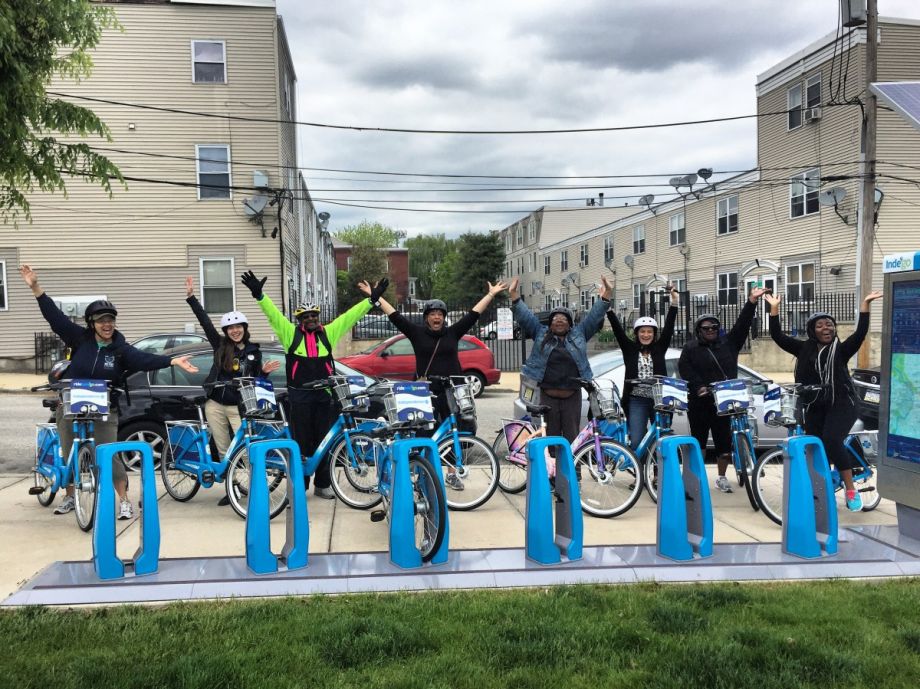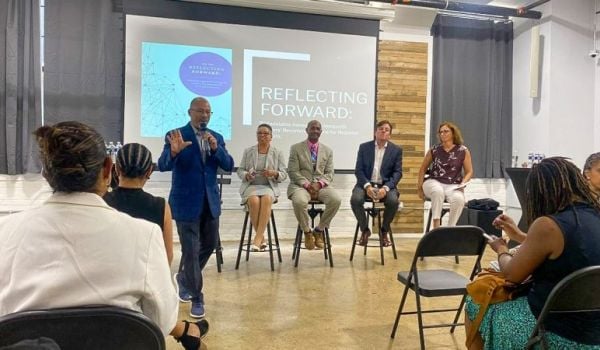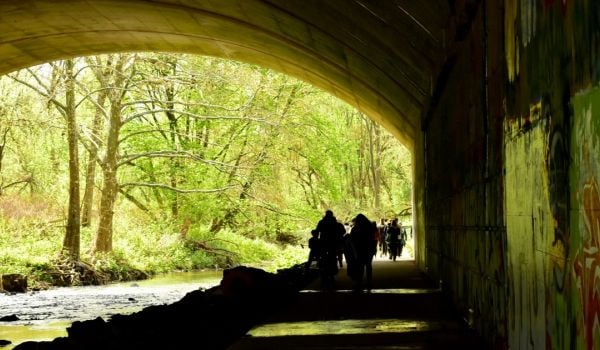In a world of ride-hailing apps and sidewalk internet kiosks, bicycling remains one of the lowest-tech thrills available to an urbanite on a daily basis. But signing up for and using bike-share? That takes a little tech savvy.
Last year, realizing digital literacy could be a barrier to participation, Philadelphia’s Indego bike-share system partnered with the city’s Office of Adult Education to offer a class they call “Digital Skills and Bike Thrills.” In it, mostly low-income students of a wide range of ages, educational and racial backgrounds learn how to navigate both city streets and common computer needs.
“Those are two huge fear factors for people: A, getting on one of those blue bikes and riding down Market Street, and then B, getting on the internet and using it in a functional way,” says Jennifer Kobrin, director of digital initiatives at Philadelphia’s Office of Adult Education. Though teaching them together may seem an uneasy marriage, “I think it’s also a testament to how much technology is integrated into everything,” she says.
Indego’s monthly pass sign-ups are done online. An app helps navigate stations and displays bike availability. Just checking out a bike requires some tech skills. In a city that has made big strides toward bike-share inclusivity — siting stations widely across the city, not just in wealthy or central locales, and offering a cash payment option — computer skills remained a potential obstacle.
“We saw a lot of people were interested in bike-share but were really nervous about going online logging in and creating a profile,” says Claudia Setubal, who manages the program from the Indego side. “Indego was really interested in accessibility, and particularly figuring out what the barriers to those using bike-share were, and to knock them down as much as possible.”
The classes grew out of another existing city program: Keyspot, a network of rec centers and community organizations that offer free computer use and training in digital skills. As part of its outreach to low-income communities, Indego began advertising to Keyspot clients, but soon it became clear that a deeper collaboration was possible. With a grant from the Innovation Fund, which provides resources to city employees to test out new ideas, the first cohort of the four-week course ran last spring, free to students.
To date, there have been four cohorts, the most recent graduating just last week. About 20 students start each class, and about 61.1 percent complete it — a higher rate than most adult education classes, says Kobrin. (The average is around 50 percent.) In the first three cohorts (data is not yet available for the fourth) students were mostly between the ages of 22 and 30 or 50 and 59. The majority were African-American. Well over half the graduates were earning less than $20,000 a year.
Orientation takes place in person, at a Keyspot location near a bike-share station, in part because Indego has realized many people need a personal touch when they’re just starting out. Facilitators help students sign up, and they receive a one-month free Indego membership. The rest of the classwork takes place online, with students completing tasks like planning a cycling route on Google Maps or searching YouTube for bicycling videos. In all, classwork takes up about five to 15 hours a week. Throughout the course, group rides get students used to bike laws and etiquette, and facilitators are available for in-person, extra help sessions for computer skills. Upon completion, graduates get another six months of Indego access for free.
Graduation takes place in person too, and according to Kobrin and Setubal, it’s a celebratory affair. “People are really just thrilled,” says Setubal. “Every time we have a graduation, someone cries.”
Setubal says graduates’ ridership rates are on par with the average member, though it’s not always easy to track renewals — how many maintain their Indego membership after the free six months ends — because people might sign up on a month-to-month basis, forgoing a membership in the winter, for example. But, she notes, the most prolific rider in the whole Indego system is a Digital Skills and Bike Thrills graduate. In six months, he’s taken over 500 trips.
That’s Ed Berry, who just got a smartphone for the first time last year. “I’m a Luddite. I’ve never really touched a computer or anything,” he says. He loves to bike, but in the 25 years he’s lived in Philadelphia, he’s had five bikes stolen. When the last one was taken three years ago, he didn’t buy another.
The course fit his needs perfectly: Berry learned to use his new phone, and he tried out the bike-share system, which is virtually theft-proof. It took a while to get used to the bikes, as they’re heavier and less navigable than the bikes he was used to, but Berry nonetheless uses them daily. He’s even visited every one of Indego’s more than 100 stations.
The next cohort starts next week, at the People’s Emergency Center in West Philly.
Jen Kinney is a freelance writer and documentary photographer. Her work has also appeared in Philadelphia Magazine, High Country News online, and the Anchorage Press. She is currently a student of radio production at the Salt Institute of Documentary Studies. See her work at jakinney.com.
Follow Jen .(JavaScript must be enabled to view this email address)
















